- Home
- Jessica Day George
Sun and Moon, Ice and Snow Page 3
Sun and Moon, Ice and Snow Read online
Page 3
“Are you still talking to the dog?” Hans Peter’s bewildered expression had passed and now he looked curious.
“Yes, and he’s talking back,” the girl said.
“Have you ever heard an animal talk before?”
“No, I . . . wait.” She pursed her lips. “This morning I could have sworn that one of the chickens said, ‘Here she comes again!’ when I opened the coop. But Einar and Anni were in the yard too.”
“Hmm.” Hans Peter crouched down beside the dog. “Can you talk to me, boy?”
The dog studied him and finally said, “I can try.”
Hans Peter looked up. “It just sounded like a whine.”
“He said he’d try,” she reported.
“What are you two whispering about over there?” Jorunn, jolly and rosy cheeked, came over to the fireside. “Are you teaching Nils’s dog a trick?” Her long-fingered hands rested on her pregnant belly with pride.
Hans Peter and his youngest sister exchanged looks. He cleared his throat. “We were trying to teach the dog to talk, but it doesn’t seem to have worked.”
“Oh, well! Nils says he isn’t very smart.”
The lass bristled at this. The dog seemed quite intelligent to her. “I think he’s smart. Let’s try the trick again.” She winked and pointed a finger at the dog. “Speak, boy!”
The dog sat up and barked.
“Good boy!” The lass tossed it a bit of lefse. “Now, lie down!”
It obediently lay down on the threadbare rug.
Another bit of lefse. “Roll over!”
The dog rolled onto its back.
“Hah!” The lass tossed it a last bit of lefse, amid the cheers of her other sisters, who had crowded around to watch.
“Kindly stop feeding that animal our dinner, pika,” their mother sniffed, bringing an end to the merriment.
“Yes, ma’am.” The girl straightened and went back to work. Jorunn and Hans Peter gave her sympathetic looks.
“Nils!” Jorunn greeted her husband merrily when he came in with the other boys from the barn. “Only see, my littlest sister has taught the dog some tricks.”
Nils laughed and came forward, and the dog dutifully performed his new feats. When their mother was not looking Jorunn crumbled a bit of yellow reindeer cheese off the wedge on the table and gave it to the dog.
“I wish you were as good with the reindeer,” Einar said wistfully as they sat down to dinner. “There’s something wrong with our oldest doe.”
“What’s that?” Jarl looked down from the head of the table. “Is she not giving the usual amount of milk?”
“She’s not giving any,” Einar grumbled. “She just tries to bite me when I come near, and after I get her hobbled and tied so that I can milk her, nothing comes.”
“That’s a concern,” Jarl said, rolling some dried fish in a piece of lefse and chewing it thoughtfully. “That white-faced doe has always been our best.”
“If she’s too old to give milk, she’s ready for the stew-pot,” Frida said. “Butcher her tomorrow. Torst, you’ve a good hand with that.”
Jarl shook his head, and Jorunn’s husband, Nils, skillfully turned the topic to something more pleasant. The lass was eager to continue talking to the dog, but it had been banished to the barn while they ate. He was not brought in that night, and she was forced to lie awake in the big bed with her mother and sisters, wondering if she were going mad, or if God had simply found an odd way of blessing an otherwise overlooked girl.
The next morning the lass went to the barn to see how Einar was doing. She had listened to the chickens, but only briefly. They were talking, all right, but it wasn’t very interesting, and they didn’t notice when she talked back. She was more concerned over the reindeer, because, like her father, she did not want to see the white-faced doe butchered. She had never cared much for reindeer, but that particular doe was the prettiest of their small herd.
Thinking of reindeer gave her pause, and she stopped just inside the barn. She had spoken to the white reindeer. Had it done something to her, so that she could talk to animals now? She thought of the kiss it had given her, the way its soft nose had felt touching her forehead, and the warmth of its breath. A certainty grew in her breast: this was not a gift from God, but from the strange, ancient spirits of the earth.
“Are you going to help or not?” Einar was in the far corner of the barn. He was holding a pail in one hand and a stool in the other, using them as barriers to keep the doe backed into a corner. She was lowing piteously, and her brown eyes were rolling.
“It hurts, it hurts, it hurts,” she moaned.
“Einar, stop that!” The lass went up to her brother and punched him lightly in the shoulder. “She’s hurt.”
“She’s just stubborn,” Einar grunted, waving the stool in the reindeer’s face.
Giving a sort of bark, the normally gentle animal ducked its head and actually charged at Einar. The lass stepped up and caught hold of the frayed rope collar as the doe lunged. The large reindeer dragged her several feet before stopping, and Einar dove into a pile of sawdust and dry moss that they used for reindeer bedding.
“Hush, now; hush, now,” the lass soothed the animal. “Ignore that silly boy, and tell me what’s wrong.”
“It hurts,” the doe panted, leaning against her. The reindeer was shaking and there were damp patches of sweat on her thick brown coat.
“What hurts?” the girl cooed.
“My udder,” the reindeer replied, and shuddered.
Einar was standing a few paces away, gaping at his youngest sister. “Is it really talking to you?”
“Yes,” she said shortly, and knelt down by the reindeer. “Please let me look. I promise I won’t hurt you,” she said. The doe shuddered again, but nodded her head all the same.
The lass crouched lower and looked at the doe’s swollen udder. It was hard to see with all the thick, shaggy hair, which was probably why Einar hadn’t noticed the problem before. There was a bite mark near one teat, and it was infected.
“A fox bit her,” the girl said to her brother. “Look here.”
Einar crouched down to look and gave a low whistle. “Well, I’ll be . . . I never even noticed!” He slapped the reindeer’s side. “Sorry, girl. I’ll get some cloths and clean it.”
“Papa bought that medicine for the cut on Anni’s hand last year,” the lass said, straightening and giving the doe a much gentler pat. “There’s some left in a brown jar in the dish cupboard.”
Nodding, Einar dashed away to get the cloths and medicine. The lass stayed behind, stroking the reindeer’s nose.
“I’m sorry that we didn’t know,” she said softly. “From now on, I’ll make sure no more foxes bother you.”
And she did, too. For how could the foxes fail to listen to her, when she listened to their woes in return?
It soon came to be known in that region that the youngest daughter of Jarl Oskarson had a way with animals. She could be trusted to calm a skittish horse or talk sense to the most wool-headed mutt, and foxes and wolves gave Jarl’s barnyard wide berth. When such things were whispered within hearing of Frida, she would sniff and turn away. But Jarl would glow with pride over his youngest daughter, and think to himself that it was a pity his wife had never found a name for her, for she was turning into quite a likely young woman.
Chapter 5
When the lass was sixteen, there was only herself, Hans Peter, and Einar left at home. The others had all married, or in Torst and Askel’s case, gone off to work in Christiania. It was a happy time, despite the weather. For though it was still cold and food was scarce, there were fewer mouths to feed.
In her practical way, the lass could appreciate her mother’s coldness toward the children, and her grim joy at seeing them off into the world. It was nice to have more room in the bed, and more blankets to wrap around you. It was pleasant to have a full belly after dinner, and know that you could have a full belly at tomorrow’s dinner as well.
; The young girl’s reputation as one who knew animals had continued to spread, and that brought the family some small reward as well. People would give half a dozen eggs from one hen for her to tell them what was wrong with another, and a brace of ducks for helping to train a new dog. The lass enjoyed listening to animals, though she never fully explained to anyone but Hans Peter how it was she got to the root of the problems.
At sixteen, the lass should have been walking out with one of the young men who lived nearby, but animals interested her much more than young men did. She did not want to end up like her mother: bitter and lonely, with nine children underfoot. The lass loved little children and thought that someday she might like one or two of her own, but first she wanted to see the world. She wanted to travel, and meet new people, and solve the mystery of Hans Peter’s sad eyes. Then maybe she would come back to their valley and marry some farmer’s son.
One summer day, or as summery as it ever was, she thought on this while she drew water from their well. She had already brought in the cheese Jarl had left as a troll-gift. Since the white reindeer had named her, she had taken to retrieving the gifts as soon as her father was off to cut wood. Then she would disguise them: cut the cheese into slices or churn the cream into butter so that he wouldn’t notice. Frida took this as a sign of good sense in her youngest child, and Jarl continued to think the trolls were being appeased.
In order to draw the water, she had to drop the bucket, hard, and break the crust of ice on the surface. But it was warm enough that she needed only a couple of wool sweaters and her mittens, no parka, so she was considering going out to look for cloudberries in the afternoon.
She heard a strange crying noise and started. Half the water slopped out of the bucket and back into the well. The lass let the rope slide through her mittens and wheeled around.
“Sorry, girl,” growled a friendly voice. “Didn’t know you were woolgathering.”
The lass looked up, and up, to meet the smiling eyes and bearded face of Jorunn’s father-in-law, Rolf Simonson. He was a huge, bearlike man with uncommonly dark hair and pale, merry eyes. In his arms he held a ragged blanket that squirmed and mewled. That was what had made the crying sound she had heard.
“Got something for you,” he grunted, holding out the bundle. “Found it this morning, and I said to Nils: Jorunn’s little sister would like this bit of a thing. I’ll take it to her.” He let out a hearty laugh.
The lass stared at him. Why in the name of all the saints would he bring her a baby? The squirming, crying bundle couldn’t be anything else.
“Come here and take it, girl, it won’t bite—well, it will, but the little nipper’s teeth don’t hurt all that much.” He waved the bundle in her direction again.
“What is it?”
“It’s an orphaned pup.” Rolf Simonson laughed. “I would have thought you’d jump at the chance for a dog of your own!”
The young lass sagged back against the well. “I thought it was a baby,” she said weakly.
Jorunn’s father-in-law roared with laughter, causing the puppy to cry and wiggle even more. “A baby? Did you think I’d stolen away your sister’s latest? A baby!”
The laughter and the squeaking had drawn Frida and even Hans Peter out of the house, and now they stood in the yard and looked from the girl to Rolf Simonson. Hans Peter was smiling his faint half smile, and Frida had made her face as welcoming as it ever was.
“Neighbor Simonson,” she said. “Will you come in and have a mug of ale?”
“That I shall, Mistress Frida,” he replied. “But first your youngest must take this puppy from me, before I drop it.”
Indeed, the little creature, though still obscured by the folds of the old blanket, was squirming ferociously. Another minute and it would writhe its way out of the farmer’s massive hands and fall to the rocky mud of the yard. The lass took hold of the bundle just in time.
A little furry head poked out as she did, and the puppy cheeped at her. Its eyes were not yet open, and it was dark gray with black markings. It cheeped again, and then sank its needlelike milk teeth into her finger.
“Ouch, stop that!” She pulled her finger free and tapped the puppy’s nose with it. Her gaze on the little creature, she followed Rolf Simonson and her mother into the house, with Hans Peter bringing up the rear.
“It’s only a few days old,” Hans Peter judged, as he and the lass crouched by the fire to have a good look at the puppy.
“Less than that, even,” Rolf Simonson told them. “I found him this morning when I went to the barn. Mother must’ve crawled out of the woods and snuggled up in the long grass just behind my barn to have him. Wandered off to have the rest somewhere else and forgot this one.”
“Thank Neighbor Simonson for the dog,” Frida snapped at her youngest daughter. She dipped him a mug of ale from the barrel in the corner and set it down on the smooth-scrubbed table.
The lass leaped to her feet, blushing with embarrassment. “Thank you so much, Neighbor Simonson. It was very kind of you to think of me.”
“You’re welcome, girl,” he said, waving away her thanks and then taking up the mug for a long swig. “A girl with your talent for animals should have one of her own!” He laughed and took another swig.
The lass could tell that her mother was not pleased to have a dog added to their household. But Jorunn’s father-in-law would hear if they gave the animal away, so Frida would be forced to let her daughter keep it. The lass was ecstatic.
“Hem,” Hans Peter coughed, bringing her attention back to the dog. “Lass?”
She sank back to the hearth and took the puppy in her hands. It began sucking noisily on her thumb.
“Lass?” Hans Peter was tugging at her sleeve.
“What is it?” She gave him an annoyed look. She had been about to get up and get some reindeer milk for the puppy. She was thinking of using an old leather glove for it to suckle from.
Hans Peter waited until their mother and Rolf Simonson were busy gossiping to lean in close and whisper in her ear. “Take a good look at this . . . puppy.”
She looked down at the little creature. Its soft fur stuck out at all angles, and it was still busily sucking at her thumb. The wisp of a tail was whirring in an almost circular motion. She looked up at Hans Peter, her brows quirked in a silent question.
He lowered his voice even further. “Can’t you see it?”
She shook her head, still confused.
“Maybe its mother was a dog, though I doubt it, but if so, then its father certainly wasn’t.”
The puppy let go of the girl’s thumb, turning its head, with its eyes still shut tight, toward Hans Peter. It growled, really more of a high-pitched squeak, and batted at his hand with a paw.
“Oh.” The lass saw it now too. Hans Peter was right: maybe one of the little pup’s parents had been a dog, but it was doubtful. By the look of things, it was a full-blooded wolf.
The girl looked at her brother, then over at the table where her mother and their neighbor were deep in conversation. She picked the wolf pup up and stood. Everyone turned to look at her. Her mother was annoyed at being disturbed. Rolf Simonson gave her a merry wink. Hans Peter made a concerned noise and rose to his feet as well.
She cleared her throat. “Neighbor Simonson, if you don’t mind, I shall call the pup ‘Rollo,’ in your honor.”
He raised his mug of ale in salute. “To young Rollo, my namesake!”
Frida snorted, and Hans Peter opened his mouth as though he would say something. The lass gave them both defiant looks and turned away.
“I’m going to cut up that old leather glove that doesn’t have a mate,” she announced. “He’ll need to be fed right away.”
Which is how the youngest daughter of Jarl Oskarson came to possess a wolf for a pet, and the stories of her way with animals grew as quickly as Rollo did.
Chapter 6
As dearly as the young lass loved to talk to animals, she had always felt, deep inside, that one day it w
ould bring her trouble. That that day didn’t come until deep in the harsh winter months of her seventeenth year was the only consolation.
By then Rollo was a strapping young animal: deep chested, long legged, and covered in soft thick fur. He was mostly gray, with a white underbelly that he showed only to the lass, and occasionally Hans Peter, if he was desperate for a good scratch. Across the top of his head and shoulders were striking black markings.
“Look at him,” Hans Peter said, standing by the chopping block to watch the wolf.
Rollo was casually lounging on the edge of the yard, near a tuft of dry grass that stuck up out of the snow. There was a family of mice living in the grass, as Rollo knew quite well. Despite his mistress’s scoldings, he was determined to catch at least one of them. After all, they were on his property.
“Rollo,” the lass said warningly. She was sitting on the woodpile, reading a letter from their sister Katla, who lived by the sea with her fisherman husband.
Clumsily refolding the letter with her mittened fingers, the lass pocketed it and shrugged deeper into her old patched parka. “Brr. I wish that Mother would finish with the candles.”
“Why do you sneeze when she’s making candles?”
“It’s the things she puts in them.” Her nose wrinkled. “The herbs and dried flowers. I wish she would just make plain ones.”
She caught sight of Rollo and half rose. “Oh, he’s going after one! Naughty!” She pointed at Rollo, whose lounging had acquired a certain tension. One black-tipped ear was pointing upward.
A plump gray mouse had emerged from the base of the tuft of grass and was testing the air with a quivering nose. Rollo maintained his position. The mouse skittered forward an inch. Rollo didn’t blink. The mouse paused, sniffed the air, and then scuttled right over Rollo’s left front paw. He didn’t flinch.
When the fat little mouse was half a pace from Rollo, the wolf leaped into the air and came down with both front paws on the mouse. Tongue lolling, he dropped down and poked his paws with his black nose, sniffing his catch.

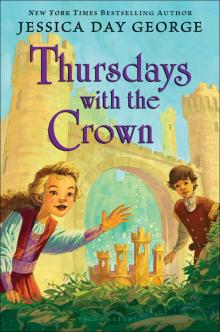 Thursdays With the Crown
Thursdays With the Crown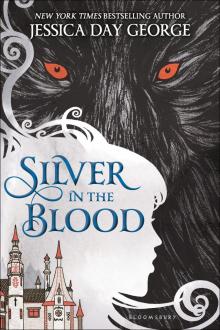 Silver in the Blood
Silver in the Blood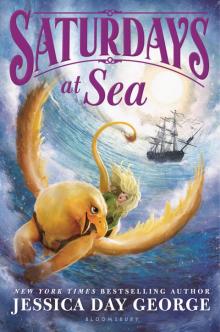 Saturdays at Sea
Saturdays at Sea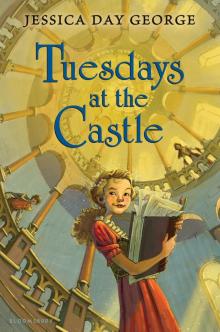 Tuesdays at the Castle
Tuesdays at the Castle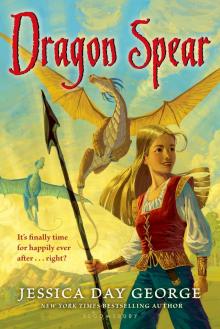 Dragon Flight
Dragon Flight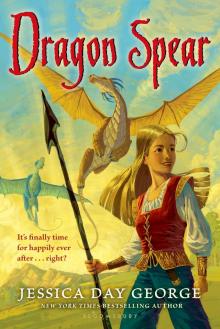 Dragon Spear
Dragon Spear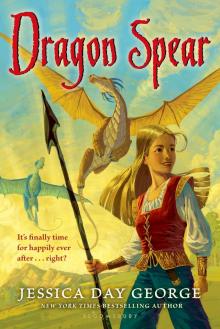 Dragon Slippers
Dragon Slippers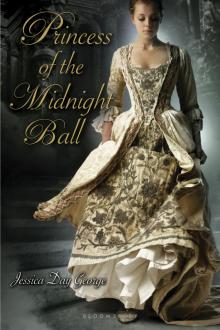 Princess of the Midnight Ball
Princess of the Midnight Ball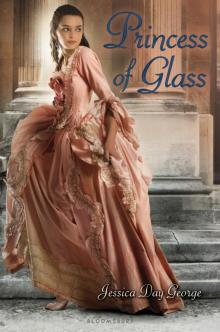 Princess of Glass
Princess of Glass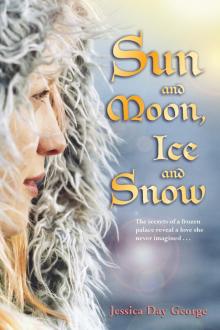 Sun and Moon, Ice and Snow
Sun and Moon, Ice and Snow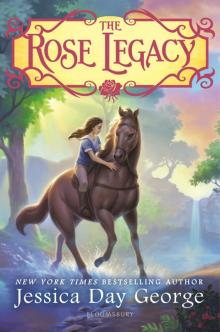 The Rose Legacy
The Rose Legacy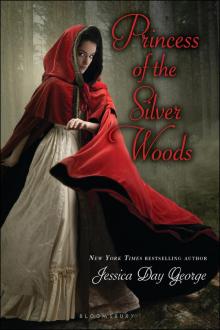 Princess of the Silver Woods
Princess of the Silver Woods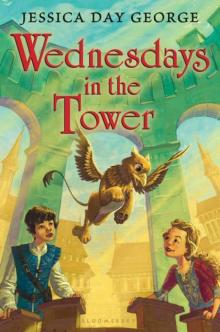 Wednesdays in the Tower
Wednesdays in the Tower The Queen's Secret
The Queen's Secret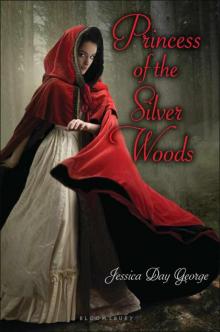 Princess of the Silver Woods (Twelve Dancing Princesses)
Princess of the Silver Woods (Twelve Dancing Princesses)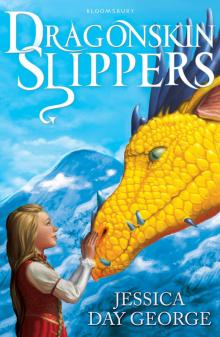 Dragonskin Slippers
Dragonskin Slippers